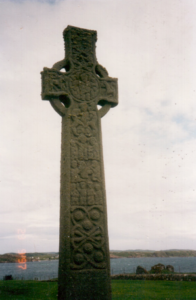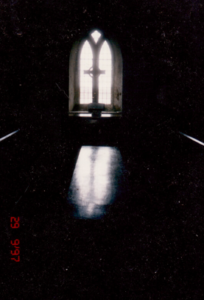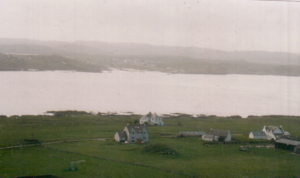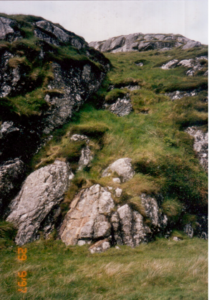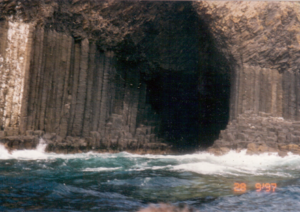Friday, June 13,2003
Eight dreams to transcribe.
1) I start to go outside, and a man steps aside for me, and lets me go first, and I go, and he stabs me! In the back. He’s going to do something but instead, I annihilate him with this blast of anger, an amazing thing. He’s literally not there on the field. There’s nothing left. It was a blast of anger, it just flashed. I’m wondering, what was that all about? I had just finished naming the seven deadly sins, of which anger is one. Susan had said I had all sorts of anger that I wasn’t aware of, that I was not wanting to have, because I was trying to be too “nice,” as she put it.
2) Nancy Dorman’s brother and I and somebody else come back from something and we’re going to leave something at her place. There’s a sign on the door that says “don’t knock.” Then we’re listening to her answering machine tape and for some reason we decide something happened to her when we were gone. We knock on the door and she opens it looking very sleepy and exasperated. Her brother says, “Well Nancy, we were worried about you because” [I forget why] and she explains that she had left a note saying not to wake her up, and we had somehow turned it all around. The common denominator there is the strength of my emotion, because I was really concerned, sure something had happened. I remember an unacknowledged sense of almost theatricality about the emotion of concern.
3) I forget the beginning part because I forgot it was a dream, but Susan and I and somebody are looking at greeting cards from the Iona Community and on the back of them it says “Peace, love and joy,” and she says. “Oh, they shouldn’t have joy in there,” and then I realized I was dreaming. (And in fact I didn’t get a sense that she was a joyous person in real life. She seemed to have great integrity, but not necessarily great joy.)
4) I was thinking about something and my hand worked the tape recorder. I was dreaming that I was taping!
5) Great satisfaction in the thought that I was sending her (whoever she was) back to her husband with my sperm in her.
6) Explaining to somebody that at Monroe all the sessions went on quite regardless of Christianity. It wasn’t a factor one way or the other. There were all these places we’d left.
7) I was running with my cat, or dog, which didn’t usually run off the yard, but ran with me, racing. I jumped over a height from a tree, onto the yard of a neighbor I had when I was a kid. The cat — my favorite cat — jumped, missed, fell, and broke her neck I think. It was ghastly. But then followed a Grin ‘n’ Bear It cartoon, a sweatshirt saying Send Bush to the Moon or something.
8) Saying to dad in some disgust after he had pointed out that what I proposed was impractical, “Well okay, but it was a brilliant idea.”
Between dreams, recurrently, I get the sense that my left arm muscles are all contracted, the arm being pulled in on itself. By concentrating I can help the muscles to relax.
I feel different at breakfast. More at home, chatty for the first time. Afterward, I go walking to Columba’s Bay, using my tape recorder. And when I later come to transcribe the tape, I find dreams I hadn’t written out. But when had I had these dreams?
- [First part lost, perhaps taped over.] I thanked him and said to him and at least one other person that I had never understood how Hitler was able to get away with so much: It was because he manipulated the politicians and the politics of other countries, by owning them or by fear.
- The detective had just cracked the case, and he says to his assistant that he’ll be glad this is the last interrogation in this case, and the guy (who is himself a criminal or ex-criminal) says “Yeah, when you’re in a bad mood you’re really open about how you feel about me.” There was something about an electric burner on a stove. Atop it is an upside-down top of a pan, and on top of that was something, and on top of that was something else. Somehow the guy was going to indicate he was going to confess, by turning on the burner. When they picked up the top two things, they realized that the third one down was hot. That’s when they knew it was going to be all over.
- [__] challenges a man about some piece of theology, and he’s got two pieces of ham that he put on top of his sandwich; one one way and the other at right angles to it. The man said, “Well, you’re just saying that to embarrass me in front of our visitor,” (meaning me) and I said “I’m not going to get involved in it.”
- My wife, I guess, wanted us to join the Catholic church just for the sake of fitting in, even though everybody knew that I didn’t believe what was going on, what it was about.
- Thinking our house was overrun then by these forces, like being in the mountains and seeing something coming down from the mountain like spirit or wind or something.
- Here at the B&B, someone is about to drink something, and I say “it’s a matched cup.” They were surprised I’d recognize even the concept – whatever a matched cup may be.
- At the cash register after a meal, there’s a drawer there and you open the drawer and there’s the books they’re holding for you, if you have any. I pick one up and pay for it at the register. There was more to the dream, but I didn’t record it in time because I was lying in bed waiting to be served!
- Won the battle and lost the war, but what did it refer to? One was a rabbit, I think, and it was wild, and somehow allowed itself to be tamed, for the sake of food, maybe.
- A dog or something sees me up there across the way and comes chasing up after me, through brush. I’m not moving, and it’s expecting to chase me. But there’s something about the spirit in a way.
- Working with wood with an assistant. We have to take time out to find the right screwdriver to unscrew these long thin metal screws from the end of the wood. I had made something and the wood had splintered off, so I need to get my assistant to unscrew the piece that was left so that we can put a new piece on.
Now then, this is what I was speaking into the recorder during the morning hike to Columba’s Bay and back.
“It just came to me: It’s not a bridge from one to the other, it’s a bridge away from all of them. The schoolmen, the churchmen, the sciencemen – all of it! I’m going to ruthlessly steal everything we need, whether it’s theology, example, organization, whatever. Because I’m more confirmed this morning than I was when I went to bed, there’s no building bridges to them. But first I should review everything that’s gone on tonight and see what it looks like.”
Fish and chips for lunch, and a scone for later, and I settled up with the B&B. (Also became a two-bit hero by using a pair of pliers to fix a loose piece on the toilet so that it would flush correctly.) Again there will be no boat trip around the island because the swells are too high. So, I walk up to the beach at the north end, and at quarter to three I’m sitting on a park bench looking out toward islands that are followed by the Atlantic Ocean. There’s nothing I have to do, and no place I have to go.
It has been a remarkable four days and four nights: more time, perhaps, than I’ve spent on myself and on my own at least since college. If I had a project I could work on every day, and manual labor of some kind, I could stay here a long time. Imagine living with an ocean on all sides. And, by the way, this is the fifth time in four days that I am sitting in a place where there is no one around, although on this fifth time, unlike the first four, I can see and hear people. But I’m still alone. There were four times, one each day, when there was no one in sight, no one in sound.
My time on Iona is more or less up, and I have to return to the other world. Don’t know that I’m going to go home transformed in any fundamental way.
“There are some things that are required, and one is that any substitute for religion – or for this religion, anyway – must deal with the heart, and not just with the head. Not even primarily with the head. At the same time, it must be as intellectually respectable as we can find. That is, we must do our best with what we have, to make sense of what we have experienced. But the experience comes first. Interpretation comes second, and dogma or theory come a hell of a long way third. And we need to restore the difference between authority and power. Authority comes because someone knows or can do. Power comes because they have the ability to punish or to hurt.
“Since this is a time when everything is coming apart, it is also a time when everything can come together in new forms and packages. Schoolmen system is gone. Same with religious. And science, the religion of rationality, is still disgracing itself. So the question becomes – in what way can science, spirituality, religion, education, and art come back to form an organic, whole, healthy unit. No one today can answer that question.
“And it just occurred to me: You don’t build bridges to shipwrecks. You might throw them a line.”
